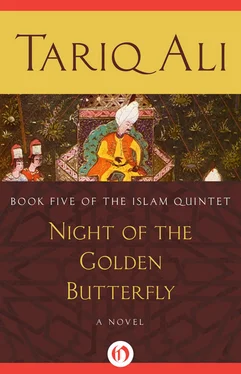‘Excuse me, Madame Auratpasand, but would you mind sharing with us which of Diderot’s works gave you such joy?’
Poor Naughty was flummoxed, on the edge of panic. She wiped some sweat off her face and sipped some water. Bertrand stepped in adroitly.
‘You told me before that it was the Story of the Nun. ’
‘Yes, yes’, said a grateful Naughty, ‘that’s the one. Brilliant, brilliant, very brilliant.’
Yusufa persisted. ‘I like it, too. Which character did you most identify with?’
This time Bertrand was prepared. ‘We can discuss Diderot another time. Now I want to ask, Madame Auratpasand, whether you have ever worn the burqa.’
She nodded, as a sad look came over her face. Zaynab hoped a few tears might follow, but they were held in check, though her eyelashes flickered in an attempt to squeeze something out.
‘I was forced to wear it by my father when I went to school. I felt badly constricted. It was as if my brain was being compressed. After I was married my husband did not insist on it, except when other men, strangers, came to our house, but not when I went shopping.’
Bertrand turned to Yusufa.
‘I started wearing a hijab only when it was prohibited in French schools and some municipalities threatened to make it illegal in public spaces. Now I quite like it as a gesture of defiance, or should I say freedom?’
‘Oh’, said Naughty, who had clearly not understood the reference, ‘I am sorry that you are compelled to wear it. Don’t you feel its oppressive weight on your mind? Stifling, crushing your thoughts?’
In response, Yusufa recited a verse whose effect was so hypnotic that it even silenced Bertrand for a few seconds:
I said to my rose-cheeked lovely, ‘O you with bud-like mouth,
why keep your face hidden like a flirtatious girl?’
She laughed and replied, ‘Unlike the beauties of your world,
In the curtain I’m seen, but without it I’m hidden.’
Your cheek can’t be seen without a mask,
Your eyes can’t be seen without a veil.
As long as the sun’s fully shining,
Its face will never be seen.
When the sun strikes our sphere with its banner of light,
It dazzles the sight from afar.
When it shines behind a curtain of clouds,
The gazer can see it without lowering his eyes .
Naughty was moved, even though she was not meant to be. Her unscripted remarks might have destroyed her.
‘So beautiful, Yusufa. So beautiful. Did you write the poem?’
‘No, no, it’s Jami.’
‘Ah, Jami,’ said Bertrand. ‘The Arabs used to produce such good poetry.’
Yusufa corrected him. ‘He was Persian, and died in 1492, not long after the fall of Granada.’
As far as Zaynab and I were concerned the young Frenchwoman had knocked out both Naughty and the referee. The rest of the interview was composed of set pieces, but Yusufa’s spirit shone through and Bertrand was discomfited and clearly annoyed with himself. The researcher who had found Yusufa was bound to suffer his wrath.
As we went down to eat, Zaynab pointed out another triumph. Henri de M. had been defeated. The eatery had reinvented itself as Eugénie Grandet’s, and as we entered I saw that the portrait of Balzac was back on the wall, together with framed covers from many of his works. And the menu was once again emblazoned with a quotation.
Zaynab now confessed that Henri had asked her to write a short book on Naughty’s rise in the world for his small but select publishing house. She had agreed. And she had met Naughty.
‘How did you manage that?’
‘I wrote a fan letter stressing our affinities and she wrote back suggesting we meet.’
‘Deception.’
‘Pure and simple.’
‘The results?’
‘I have the whole story, but Henri is joining us soon, so you’ll have to wait. It will be boring for you to hear it repeated.’
I did not have to wait too long. Henri walked in and laughed as he saw how the place had been transformed. ‘This one you have won,’ he acknowledged.
He, too, had seen the Arte interview and expressed his delight at Yusufa’s performance. He would try to contact her, to judge whether or not she had a book in her, but in the meantime he was banking on Zaynab to lift the veil on Madame Auratpasand. ‘Her response to the Sufi poem must have worried her minders.’
I pointed out that it was a tiny lapse and they would soon correct it. If anything it had humanized Naughty a little. They could use that to their advantage. Henri took out that day’s Herald Tribune and put it on the table. There on the front page was Naughty, flanked by Bertrand and some of the pioneers in her own field, who included an uncongenial and bloated novelist, permanently high on his own fame or shame, whichever way one looks at it, who wore a crooked smile for the cameras while his beady eyes were unashamedly turned in the direction of the well-stroked Naughty mammaries (or mammas , as they are affectionately known in Punjabi, and immortalized as such, at least for his friends, by Plato’s song line in their honour).
‘She’s on course for two or three prizes this year,’ said Henri, with a maniacal laugh. ‘What will be the contents of your book, Zaynab? And when can I expect a finished manuscript?’
‘The contents are obvious. It’s her story as she told it to me. In her own words, but with explanations by me where necessary. In a phrase, the unvarnished truth.’
Had Zaynab actually taped the conversation?
‘Yes, and with her knowledge.’
I was astonished. ‘She trusted you completely?’
‘By the end she did. And we were wrong. She’s not a monster. Could have become one, but held back.’
Henri, ever sceptical, inquired whether Naughty was aware that this material she had provided might be published.
‘As you will see in the transcripts, I informed her of this possibility and she agreed with a nervous laugh. Her only stipulation, also on tape, was that I warn her well in advance. She’s entranced with her new landscape, but has few illusions. I have to confess that I liked her. She hasn’t an ideological bone in her body and knows only too well that she’s being used, as she has been all her life. She wants the truth for her children, who will not speak to her at the moment. Bertrand wanted her to go big on this aspect of the operation: her courage is measured by the disaffection of her children, whom she has had to discard. Diderot and Medea in one. She refused. If her children were mentioned in any newspaper, the whole deal was off.’
‘This is remarkable,’ said Henri, after he had digested the information. ‘We’d better make copies of everything, and I will consult our lawyer when we’re ready. This could be explosive.’
Zaynab handed him three copies of the transcript and three CDs.
‘You are a real professional, Madame Koran.’
As I read the transcripts the next morning I, too, thought that Henri de M. had an excellent book on his hands. Naughty’s stories about everyday life with her husband and the generals, an unremitting account of moral, political and financial corruption, was of much greater interest to us than to Western readers, but her account of how she had been head-hunted by French Intelligence and seduced into her new role was a fascinating insight into the murky world of modern war propaganda. It had always been the same game, but new conditions and new enemies required new methods, and the land where the Enlightenment was born was perfectly situated to carry them out, much more subtle at it than the wooden-headed Dutch and Danes, who were rash and crude in their methods.
Читать дальше












